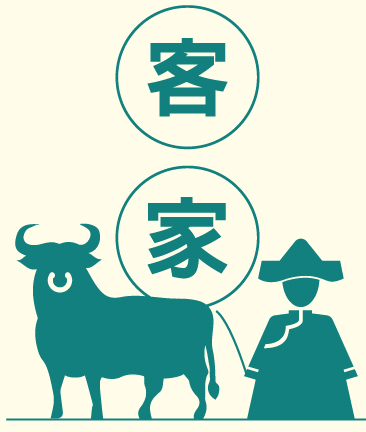


The Hakka is an ethnic group which has left its home and settled down in other places, to live among people not their own kind. (The word “Hak-ka” means “guest people”). One of their characteristics is their courage in venturing out of their native land.
Originally residing on the central plains and hills of China, Hakka people have been migrating south to find better livelihood since Qin Dynasty (221 B.C.E - 206 B.C.E) and they were responsible for cultivating lands in eastern Guangdong, western Fujian, southern Jiangxi, and also in Guangxi and Hainan, among other provinces. They were sometimes nicknamed the “Oriental Gypsies” as they were perceived to be nomads moving around different places.
Statistics show that the current Hakka population in Hong Kong is about two million (30% of population). Most of their ancestors migrated to Hong Kong during the Qing Dynasty (1644–1912) and established villages in Yuen Long, Tai Po, Sai Kung and Tsuen Wan for farming and settling down. Due to their great perseverance, they took roots firmly here, and for centuries Hakka people managed to maintain and pass on their traditional customs and cultures to their younger generations. The heritage includes Hakka dialect, Hakka villages (many are walled villages), Hakka cuisine, Hakka mountain songs, special festivities and Hakka customs. In addition, these Hakka traditions were able to mix with Hong Kong traditions and eventually became part of the Hong Kong lifestyle. However, with changing times, old Hakka traditions are fading away and one ought to visit the walled villages personally, to learn about them from Hakka old folks.
Originally residing on the central plains and hills of China, Hakka people have been migrating south to find better livelihood since Qin Dynasty (221 B.C.E - 206 B.C.E) and they were responsible for cultivating lands in eastern Guangdong, western Fujian, southern Jiangxi, and also in Guangxi and Hainan, among other provinces. They were sometimes nicknamed the “Oriental Gypsies” as they were perceived to be nomads moving around different places.
Statistics show that the current Hakka population in Hong Kong is about two million (30% of population). Most of their ancestors migrated to Hong Kong during the Qing Dynasty (1644–1912) and established villages in Yuen Long, Tai Po, Sai Kung and Tsuen Wan for farming and settling down. Due to their great perseverance, they took roots firmly here, and for centuries Hakka people managed to maintain and pass on their traditional customs and cultures to their younger generations. The heritage includes Hakka dialect, Hakka villages (many are walled villages), Hakka cuisine, Hakka mountain songs, special festivities and Hakka customs. In addition, these Hakka traditions were able to mix with Hong Kong traditions and eventually became part of the Hong Kong lifestyle. However, with changing times, old Hakka traditions are fading away and one ought to visit the walled villages personally, to learn about them from Hakka old folks.








